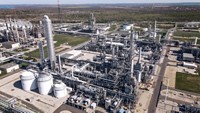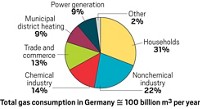Advertisement
Grab your lab coat. Let's get started
Welcome!
Welcome!
Create an account below to get 6 C&EN articles per month, receive newsletters and more - all free.
It seems this is your first time logging in online. Please enter the following information to continue.
As an ACS member you automatically get access to this site. All we need is few more details to create your reading experience.
Not you? Sign in with a different account.
Not you? Sign in with a different account.
ERROR 1
ERROR 1
ERROR 2
ERROR 2
ERROR 2
ERROR 2
ERROR 2
Password and Confirm password must match.
If you have an ACS member number, please enter it here so we can link this account to your membership. (optional)
ERROR 2
ACS values your privacy. By submitting your information, you are gaining access to C&EN and subscribing to our weekly newsletter. We use the information you provide to make your reading experience better, and we will never sell your data to third party members.
Finance
Record natural gas prices roil European industry
Ammonia production is hard hit in the UK and Continent
by Alex Scott
September 1, 2022
| A version of this story appeared in
Volume 100, Issue 31

European chemical companies that use natural gas as a source of energy or raw material are reeling from another price spike in the region. In the past week, the price of gas hit a record $342 per megawatt-hour, double that of a month ago and several times as much as the price a year ago.
The fertilizer company CF Industries says high prices for natural gas have forced it to temporarily halt production at its ammonia plant in Billingham, England. Natural gas is the main raw material in making ammonia. The firm closed its other UK ammonia plant in September 2021 and now will import the fertilizer.
The new closure is set to have knock-on effects, as the Billingham plant provides about one-third of the UK’s commercial-grade carbon dioxide. Steve Elliott, CEO of the Chemical Industries Association, a UK trade group, says in an email that the chemical industry needs more direct government support.
The latest surge in gas prices is linked to a decision by the Russian gas supplier Gazprom to temporarily close the Nord Stream pipeline, which moves gas from Russia to Germany. On Sept. 1, Gazprom was 2 days into a planned 3-day shutdown of the pipeline; it says the action is required for maintenance.
The Norwegian fertilizer producer Yara International is also struggling with the price of gas. It has already cut ammonia production and now plans to further reduce output to about 35% of normal levels.
Chemical companies in Germany have reduced the output of some products, including ammonia, according to VCI, a German chemical industry association. “Energy costs are exploding, the competitiveness of our export industry is at stake,” VCI says in a press release.
Chemical production by the European Union’s 27 member states fell 0.7% in the first half of 2022 from the same period in 2021, according to the European Chemical Industry Council (Cefic), a trade group. “Generally, the impact of the Russia-Ukraine war continues to weigh strongly on European chemicals producers. The chemical sector remains uniquely dependent on secure and stable supplies of natural gas,” Cefic says in an email.




Join the conversation
Contact the reporter
Submit a Letter to the Editor for publication
Engage with us on Twitter